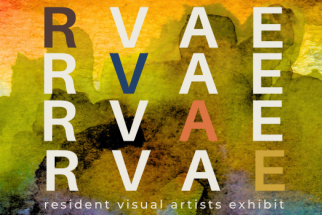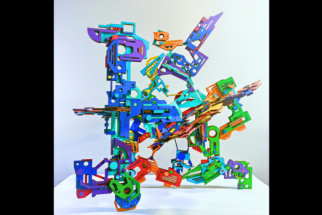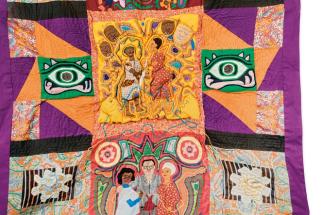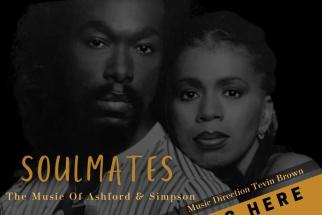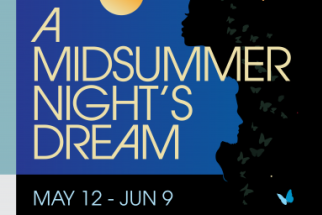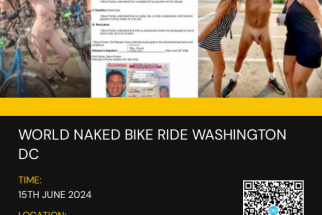Encoach: Georgia Dickie + Keith J Varadi
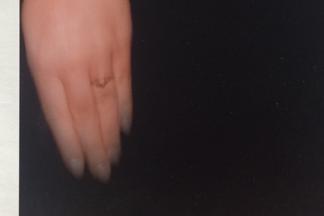
Springsteen is thrilled to present Encoach, a two-person exhibition featuring Georgia Dickie and Keith J. Varadi. Please join us for the opening reception, Saturday, September 10, from 7-10pm. Exhibition will be on view through October 8.
Running into the pancake restaurant from the van in the snow, feeling the oil on/in the hair, it is clear that we have time-travelled to an earlier time. The hair on my head is suddenly plentiful. Around this time, I have been coating my face in Vaseline every night as a part of the show I’ve been doing on this Rust Belt tour — weird for this writing assignment; but on this tour, I’ve been mostly doing Springsteen covers. I’ve been trying to capture the feeling of being both totally capable of making the economic transition, of jumping when the one ship sinks and the other ship comes into view, but realizing that you making that jump is not the "good" move. If you jump clear and the rest of the people drown on the sinking vessel, you're not actually safe. If you transition to the new economy, that’s great for you, but what do all these people do? Your meatbag may have survived, but to what end? What do you do with all these towns? You need all those people; we need all the people. There is no life to live outside of society. That is the weird point I was trying to make with all that.
There are no individuals. It's a lie. No one, no one, has ever actually been alone. The idea that identity is a flexible issue, that there are different versions of us, is wrong — based on a false assumption that there is a single person on earth at all. There is no self without some conception of another; there are only ever really constellations — images formed from the understanding that we act around and with others, even very absent others. So we aren’t changing individual identities in different contexts, but those contexts themselves define sets of behaviours and attitudes that are exchanged within, and all of those relationships are trans-individual. Levinas, in the only moment of his writing I could decipher (sorry), tells us there is a duty in the face. There is always another face; you have to look in a mirror sometimes. Even the loneliest person understands their position in relation to imagined others — a truly alone person wouldn't even understand the concept.
Being an only child, I can't imagine what it would be like to have a sibling. I remember watching my mother at my aunt's funeral — my aunt was the older of the two siblings; my mother had known her her whole life. I was watching a relationship that, while I could understand something of it, I couldn't understand that much of it. It was mysterious. It was a different kind of grief than what I remember from when my grandfather, my mother's father, died. Or from when my paternal grandfather had been beaten to death in a home invasion. Or from when my paternal grandmother died of deep old age. My father would never have another father or mother, but he had all these siblings. Once his parents died, he began fighting non-stop with his living siblings, almost like he was just waiting for mom and dad to look the other way before going nuts in the back of the station wagon.
So even though I chose this extreme example — the death of a sibling — to frame the epistemic segment of my argument about choice-making in society and our ethical responsibilities to ‘others,’ and even though I will never understand having a sibling — I can still never be alone. I am thinking of my relationship to my mother and aunt, to my aunt's husband — a weird organist, a strange person — who will never read any of this. He once refused to even go check out an exhibition I was in at a Canadian museum WHILE HE WAS IN THE SAME MUSEUM TO SEE OTHER THINGS, because on principle he doesn't like art made during his lifetime. Who can't spare that minute for family? I wasn’t even asking him to like it, you know? Who is this guy my aunt married? Who is the man who grieved for her so hard at the funeral home in Waterford, Ontario? Who's alone and how?
Busting through the doors of the pancake restaurant — itself some kind of museum, in West Virginia or Pennsylvania or Ohio (where on earth are we?) — I know that I am impossibly in the past. In the future from that moment, I am in a "present" — I’m a man typing on a Bluetooth keyboard so different from the mechanical keyboards that were the only keyboards available in the early 2000s. I am seeing my reflection in the glass as I push through the second set of glass doors into the roadside restaurant, I see an older, balding self — a horrid vision, a decaying semi-corpse. The Midwest is indeed full of ogres.
This will all be worth it in the future. The relationships I'm having now, here in the pancake restaurant — the girlfriend I'm texting on my Nokia candy bar phone, the goals I invent to placate my worried parents when we meet, the interests I share with my aunt when we run into each other on University Avenue on our way to the library to do our own individual research; this will all pan out. I am not the bald wreck I catch a view of in the door as I push it open and run into some version of Waffle House, but not Waffle House — it's an independent business. I need to pee, I have a full head of greasy hair, I've been on tour for a week, and I have a week left to go before our last show in Philadelphia where my girlfriend will meet me and then drive us both back to New York in her Mitsubishi jeep-style vehicle.
On the way back to New York, we hit some insane traffic. Taking a detour, we realize that the BQE is totally closed. We find ourselves stuck in terrible traffic at 3 AM, crawling through some detour in some part of New York City in some pre-Waze navigation nightmare. We cross the BQE on an overpass, and we see the cause of all this late night traffic — total carnage. There are three transport trucks jackknifed on the road — the whole thing, both ways, obstructed by these totally fucked vehicles, at least one of them is on fire. There are tons of fire trucks, there are shredded cars spread everywhere. Something so fucked happened earlier. It didn't work out. Someone totally died there.
Last month, Keith (other Keith, actually) and I talked about this friend of ours (Carl) who got a motorcycle. His truck finally caved in, and he didn't have enough cash to get a decent new car, so he bought a bike instead. He had tons of experience — his father rode bikes, he'd ridden bikes all through high school and such in Florida. But both Keith and I were terrified. Yet another friend who rode a bike had just gotten in a catastrophic accident and was lucky to be alive and lucky to have good health insurance. His pelvis was shattered into so many parts. The accident he was in was an accident that could have happened to anyone — a real accident, the kind of thing that "just happens." In the three weeks leading up to hearing about Carl’s new bike, my future wife, saw three fatal motor bike accidents. She described one to me that was the worst — the helmet shattered, the streak of blood on the pavement, the body limp. Keith (other Keith, still) and I shared these stories, worrying about Carl, wondering secretly if Carl had thrown in the towel. How do you have an intervention about a vehicle? Stephen Kaltenbach told me the story of how he ruined his foot — he was high and riding his bike, and faded out a bit, but then skimmed into a bridge pylon. His foot could not be put back together normally again after. His legs aren't the same length now. He wears special shoes.
Art is a terrible risk, and no one would do it if they didn't believe in themselves. I’m not sure if I buy it, but the idea has been floated that we, who do this shit, hope that through this work we can maybe escape. Even if you have to hand in your meatsack at some point, your work will stand in for you later. It's the deposit you put down. Pay the meat price and get in the art tube.
I throw the bottle at the wall. The family I'm staying with here in the French mountains are going to be disappointed in me, but the internal anger demands I do this. French children don't see these things the same way — they don't have the same relationship to their parents that North American children seem to. I'm glad Keith and Georgia asked me to write for this show. I love their work. As the bottle shatters against the field stone wall that is who-knows-how-old, that maybe Romans threw Roman bottles (ampullae?) at sometime in the dark past, I'm failing somehow. The post-teen who was covered in Vaseline stumbling through the door of a sub-Waffle House somewhere in the Rust Belt was a better man, probably. What happens when you’ve done the things you hoped to do, but possibly, those things lead to the complete deterioration of your actual body? What if you were wrong from the start? Believe it or not, this piece started out as a reflection on the way primary accumulation and risk were interrelated. It was based very strongly on some ideas detected in the work. JSYK.
— Steve Kado, Poueyferré, France. August, 2016.
Georgia Dickie (b. 1989, Toronto, Canada) graduated with a BFA from the Ontario College of Art and Design University in 2011. Her work addresses the complexities of contemporary object-based practice and is characterized by a deep interest in found materials and their inherent limitations. Recent and forthcoming exhibitions include Springsteen, Baltimore; Et Al, San Francisco; Halsey Mckay, East Hampton; Cuevas Tilleard, The Journal, New York; Greene Exhibitions, Los Angeles, USA; V1 Gallery, Copenhagen, Denmark; Xippas, Paris, France; Croy Nielsen, Berlin, Germany; COOPER COLE, The Power Plant, the Museum of Contemporary Canadian Art, Toronto; Oakville Galleries, Oakville, Canada. In February 2015, she was the Canada Council for the Arts artist in residence at Acme Studios in London, UK. Dickie currently lives and works in Toronto, Canada.
Keith J. Varadi (b. 1985, Pittsburgh, PA) is an artist, writer, poet, performer, and curator, who has mounted solo exhibitions at Night Gallery (Los Angeles), Cooper Cole (Toronto), and Et al. (San Francisco) this past spring. His writing has appeared in Art in America, Carla, Kaleidoscope, LEAP, and Spike Art Quarterly, among other publications. Additionally, he has recently released a book of poetry and photography (Maga Books) and a limited edition 7" record (Night Gallery).
